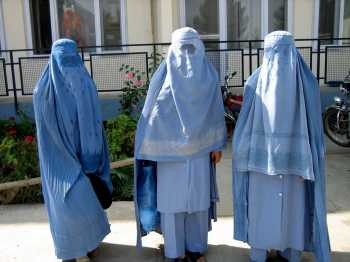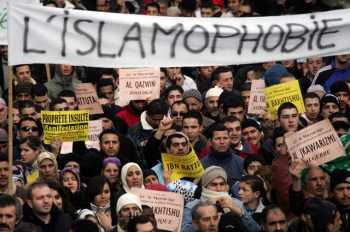France’s controversial July 13 ban on burqas is not an isolated ruling.
Several European nations are considering following suit, and many countries have previously passed legislation restricting the use of the Muslim face veil.
On July 18, Syria ‘s Education Ministry announced a ban on niqabs—full face veils and robes, similar to burqas—in all of the country’s public and private universities.
“We have given directives to all universities to ban niqab-wearing women from registering,” said an anonymous government official in an Associated Press report.
The ban is intended to secure Syria’s identity as a secular nation. Bassam Qadhi, a Syrian women’s rights activist, said that while many describe the choice to wear a niqab as a “personal freedom,” she believes the religious practice of requiring women to wear niqabs is oppressive.
A 19-year-old student told Arab News that “the niqab is a religious obligation,” and that she will not be able to study if she is prohibited from wearing the veil in class.
The French ruling also inspired neighbor nation Spain to heavily consider banning burqas as well. The Spanish Parliament began debating a proposal shortly after France’s lower house of Parliament overwhelmingly passed its ban.
Spanish Justice Minister Francisco Caamano has said that burqas “are hardly compatible with human dignity.”
In June, Barcelona banned burqas and niqabs from government buildings, issuing a statement that asserted that the garments “hinder personal indentification.” Several smaller town in Spain, which has a Muslim population of 47 million, have similar laws, though city officials do not have the power to prohibit veils in public places.
Barcelona’s ruling was met with much resistance. “To legislate against (the use of burqas and niqabs) undermined civil liberties,” said Spanish Islamic Commission’s Mansur Escudero in an Arab News report. “If a woman wants to wear one, then why shouldn’t she?”
In April, Belgium was the first European country to ban burqas. Bruno Tuybens, one of just two Members of Parliament who voted against the ban, told Al Jazeera English, “This law disturbs me. I believe in freedom of expression and I don’t think it should be restricted unless it’s in very exceptional circumstances.”

French Muslims protest burqa ban
On the difficulty of identifying someone wearing a veil, Tuybens said, “There is no link at all between crime and wearing the burqa or niqab.”
Less than a week after Belgium’s law was passed, an Italian woman was fined $650 for wearing a burqa. Though there is no Italian law against the veil, the woman was fined for breaking a 1975 law that prohibits people from covering their faces in public.
Hijabs—Muslim headscarves that do not obscure one’s identity—are still legal in most of Europe. They have been banned for decades, however, in the Muslim nations of Turkey and Tunisia. In 2004, France banned hijabs in public schools, additionally prohibiting students from wearing other religious symbols, such as the Christian cross or a Jewish yarmulke.
Though many nations have been following Belgium’s lead, the United Kingdom is adamant about avoiding a ban. “Telling people what they can and can’t wear, if they’re just walking down the street, is a rather un-British thing to do,” said Immigration Minister Damian Green in a Telegraph report. “We’re a tolerant and mutually respectful society.”
—Natalie Orenstein/Newsdesk
VIDEO: BBC: Is burqa ban Islamophobic?
CITATIONS:
Syria bans full Islamic face veils at universities
Arab News, July 20, 2010
Spain to consider banning burqas in public
Arab News, July 19, 2010
Barcelona to ban face veils
Al Jazeera English, June 16, 2010
Italy fines Muslim woman over veil
Al Jazeera English, May 4, 2010
Anger at Belgian face veil ban
Al Jazeera English, April 30, 2010
Spain considers burqa ban
The UK Telegraph, July 20, 2010
What’s the difference between hijab, burqa, etc
Christian Portal News, July 16, 2010
I have heard that Muslims are now going to hold Burka pride in the cities/countries where they are banned.
After watching the footage and listening to the opinions I am untterly appaled that people in the UK are protecting the ‘right’ to wear a Burka. It is not a ‘right’ to wear a burka that these women have, it’s an obligation. These women are supressed, subordinated and at the mercy of dictatorial men who have created religious laws at their own discretion. Whilst these women are isolated from having the freedom of an identity and to feel the sun on their face and the wind in their hair, they must cover themselves in head to toe. It’s time to wake up and listen to the sense that the French Government are talking and to appreciate their gusto at actually taking charge of this exasperating and disgraceful farce that women living in Western Societies in 2010 are covering themselves up, whilst men wear shorts and t-shirts and drool over the western women in summer dresses and jeans. Before long if the soft and weak governments like ours in the UK, continue as they are, the whole of Europe will be wearing Burkas and be at the mercy of the Shariah Law. This is Britain and we have the right to protect our culture. If people want to live in Britain, then please come here, work for a living and obey our rules like we do. That’s a democracy.
Pingback: NPR: Female Imams Blaze Trail Amid China’s Muslims
I think it is right to ban burqas in college courses, airports and government offices– anywhere that personal identification is important. After all, how do you know who is really taking the course (the driver’s test or the flight,) or more importantly, who is really taking the tests that enable one to pass courses and get degrees? Nobody can know who it really is if one is wearing clothing that covers the face.
I’m a syrian girl and I’m happy with this law it is about time to see such laws in our secular country
ironically neither : burkka nor hijab is the quraan the only thing in quraan is a test that say women should cover their cleavage
sadly :( i like to show my cleavage
Pingback: The Burka Ban – 1 | ShahidulNews
Pingback: [Editorial Draft] The Shootings in France and Their Importance Worldwide « enulau
Pingback: France Leads Move to Ban the Burqa | HMH Current Events